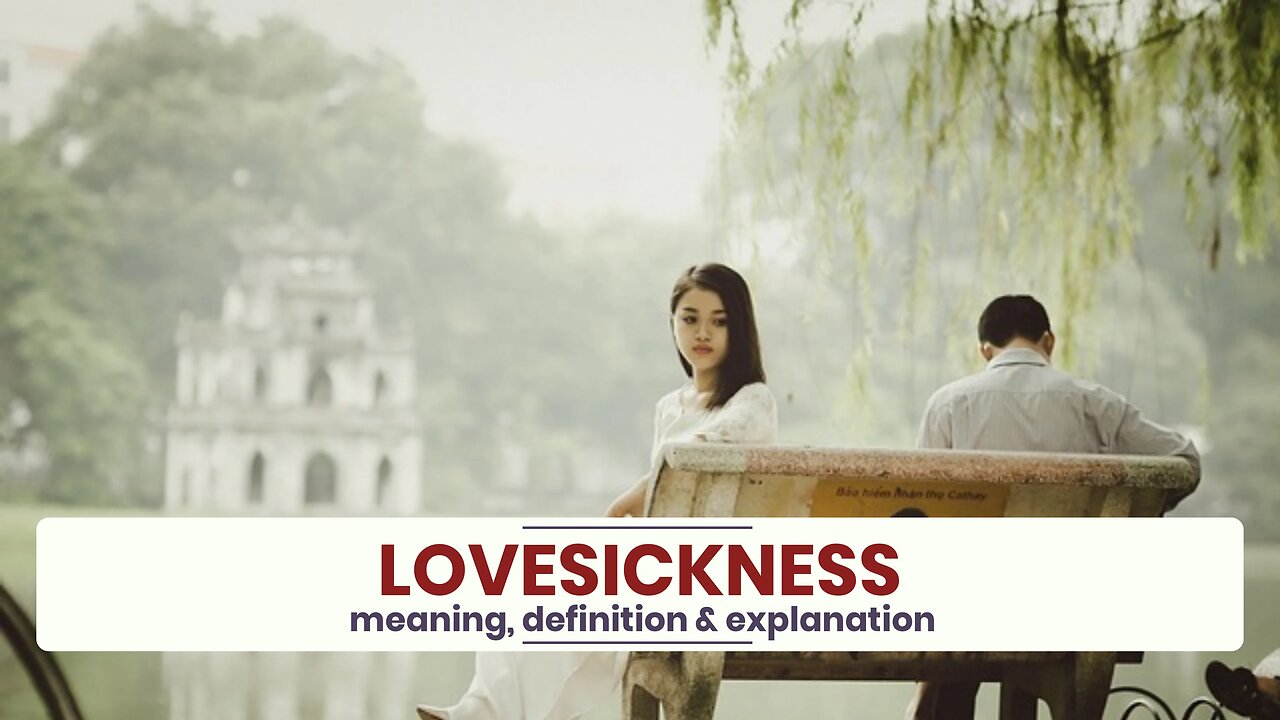Premium Only Content

What is LOVESICKNESS?
✪✪✪✪✪
http://www.theaudiopedia.com
✪✪✪✪✪
What does LOVESICKNESS mean? LOVESICKNESS meaning - LOVESICKNESS definition - LOVESICKNESS explanation. What is the meaning of LOVESICKNESS? What is the definition of LOVESICKNESS? What does LOVESICKNESS stand for? What is LOVESICKNESS meaning? What is LOVESICKNESS definition?
Love-sickness refers to an informal affliction that describes negative feelings associated with rejection, unrequited love or the absence of a loved one. It can manifest as physical as well as mental symptoms. It is not to be confused with the condition of being lovestruck, which refers to the physical and mental symptoms associated with falling in love. The term lovesickness is rarely used in medical or psychological fields.
Many people believe love-sickness was created as an explanation for longings, but it can be associated with depression and various mental health problems.
Literature and poetry have often described love as a kind of madness, and the medical profession takes a similar approach. According to the Hippocratic Medicine view, passionate love will almost always fade or turn into 'love melancholy’ — this is a form of depression or sadness. Passionate love is the love in the "honeymoon phase", the beginning of new love, but it burns itself out after a year or two, compassionate love is what occurs after passionate love fades, it is a stronger bond of companionship. In both cases, love-sickness can be experienced if love is lost or unrequited.
In 1915, Sigmund Freud asked rhetorically, "Isn't what we mean by 'falling in love' a kind of sickness and craziness, an illusion, a blindness to what the loved person is really like". Long before Freud, in 360 B.C.E, Plato stated, “Love is a serious mental disease,” and Socrates added that “Love is a madness”. Love sickness isn’t just a form of expression for those head-over-heels, but has been studied as an actual illness.
Scientific study on the topic of love-sickness has found that those in love experience a kind of high similar to that caused by illicit drugs such as cocaine. In the brain, certain neuro-transmitters — phenethylamine, dopamine, norepinephrine and oxytocin — elicit the feeling of high from “love” or “falling in love” using twelve different regions of the brain. These neurotransmitters mimic the feeling of amphetamines.
On average a psychologist does not get referrals from general practitioners mentioning "love-sickness", although this can be prevalent through the language of what the patient feels. With the common symptoms of love-sickness being related to other mental diseases, it is often misdiagnosed or it is found that with all the illnesses one could be facing, love is the underlying problem. This is incredibly dangerous when one does not seek help or cannot cope because love has been known to be fatal (a consequence of which might be attempted suicide, thus dramatising the ancient contention that love can be fatal).
In his book "The Social Nature of Mental Illness," Professor Len Bowers brings up the fact that although physiological differences exist in the brain of those that are deemed "mentally ill," there are several other criteria that must be met before the differences can be called a malfunction. It is possible, therefore, that many mental illnesses, such as love-sickness, will never have strong enough evidence to officially be considered a legitimate affliction.
Frank Tallis, a researcher in the topic of love and love-sickness, suggests in his 2005 article that lovesickness occurs when one is “truly, madly, deeply” in love and should be taken more seriously by medical professionals. Similarly, health experts agree that love-sickness has been known to kill and the diagnosis process should be taken more seriously. Symptoms of lovesickness are usually misdiagnosed for various other diseases or mental health issues such as OCD, this is because love sickness is less commonly recognized as a mental health issue in itself even though love-sickness is an extremely common, widespread disease.
William Shakespeare's Romeo and Juliet portrays the true madness of "love" and the grief that the two young, infatuated lovers feel. When Romeo finds his love dead (or so he believes), with the thought of living without his "true love", the grief and depression overcomes him and he takes his own life. Juliet, after awaking and upon seeing his dead body is also overcome with despair and takes her own life.
-
 2:28
2:28
The Audiopedia
9 months agoWhat is MORTGAGE BROKER?
21 -
 2:00:11
2:00:11
Redacted News
3 hours agoMELTDOWN! Trump’s Tariffs causing outrage on both sides, gold surges, markets meltdown | Redacted
83.8K39 -
 22:46
22:46
JasminLaine
2 hours agoDid Carney Just CONFIRM It’s RIGGED? Poilievre WRECKS Reporter ON AIR
1.24K9 -
 12:48
12:48
Tactical Considerations
2 hours agoM&P Carry Comp.. Almost Perfect Or Is It?
1.57K2 -
 1:41:13
1:41:13
vivafrei
6 hours agoTrump Tariff War IS ON! Canada's Political Prisoners Sentenced! Eric Adams Runs as independent?
64.7K26 -
 43:43
43:43
Kimberly Guilfoyle
5 hours agoThe Global Gravy Train is Over, Live with Elizabeth Pipko & Rob Bluey | Ep210
54.9K20 -
 LIVE
LIVE
Dr Disrespect
8 hours ago🔴LIVE - DR DISRESPECT - WARZONE - OG VERDANSK
3,234 watching -

LFA TV
23 hours agoLFA TV - ALL DAY LIVE STREAM 4/3/25
120K17 -
 2:14:02
2:14:02
The Quartering
6 hours agoBlack Youth KILLS White Kid At Track Meet, Stock Market Crash, Fast Food Prices & More
184K81 -
 1:05:34
1:05:34
Russell Brand
7 hours agoIs Musk out?? Are We Rewarding Political Violence Now? – SF560
194K192